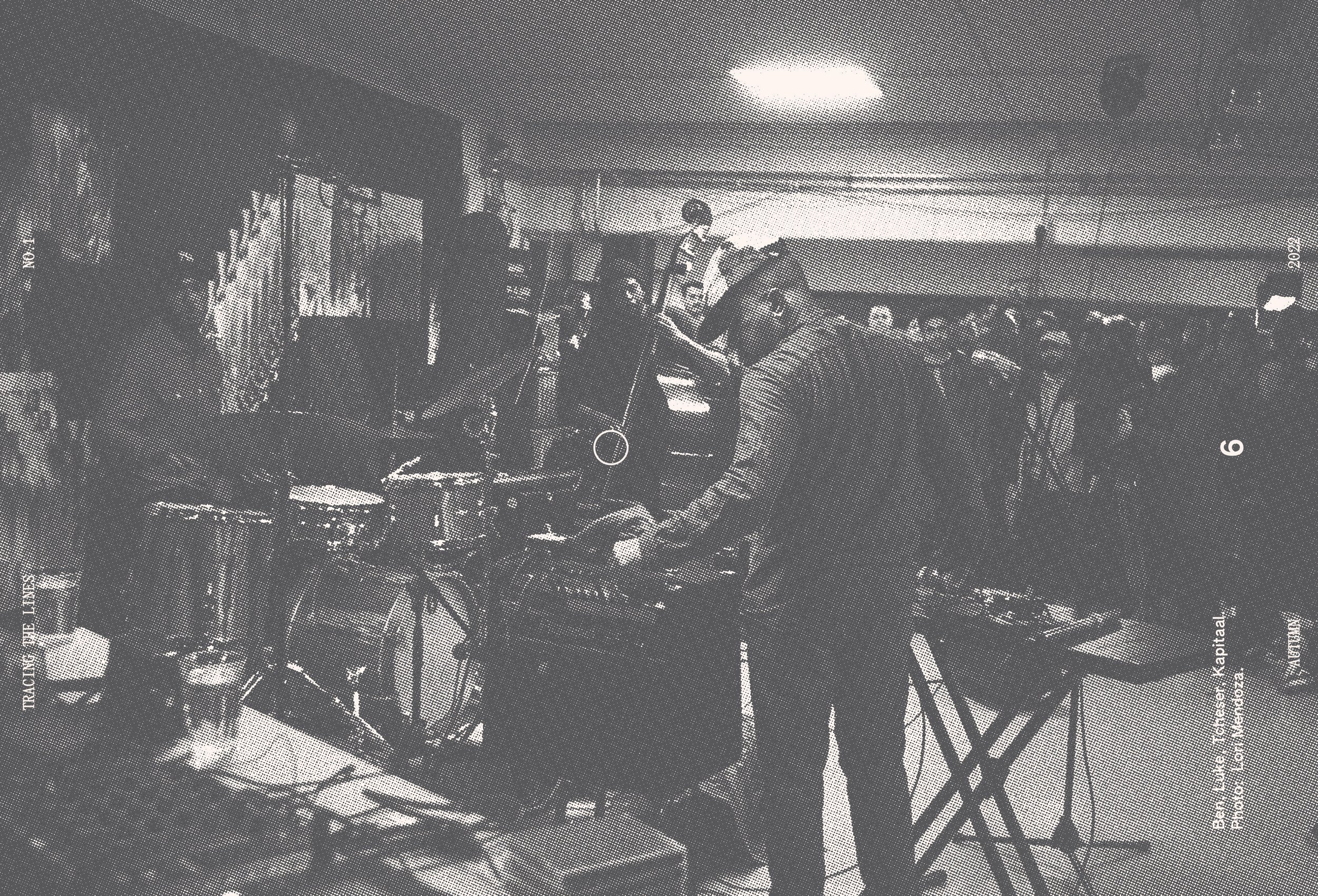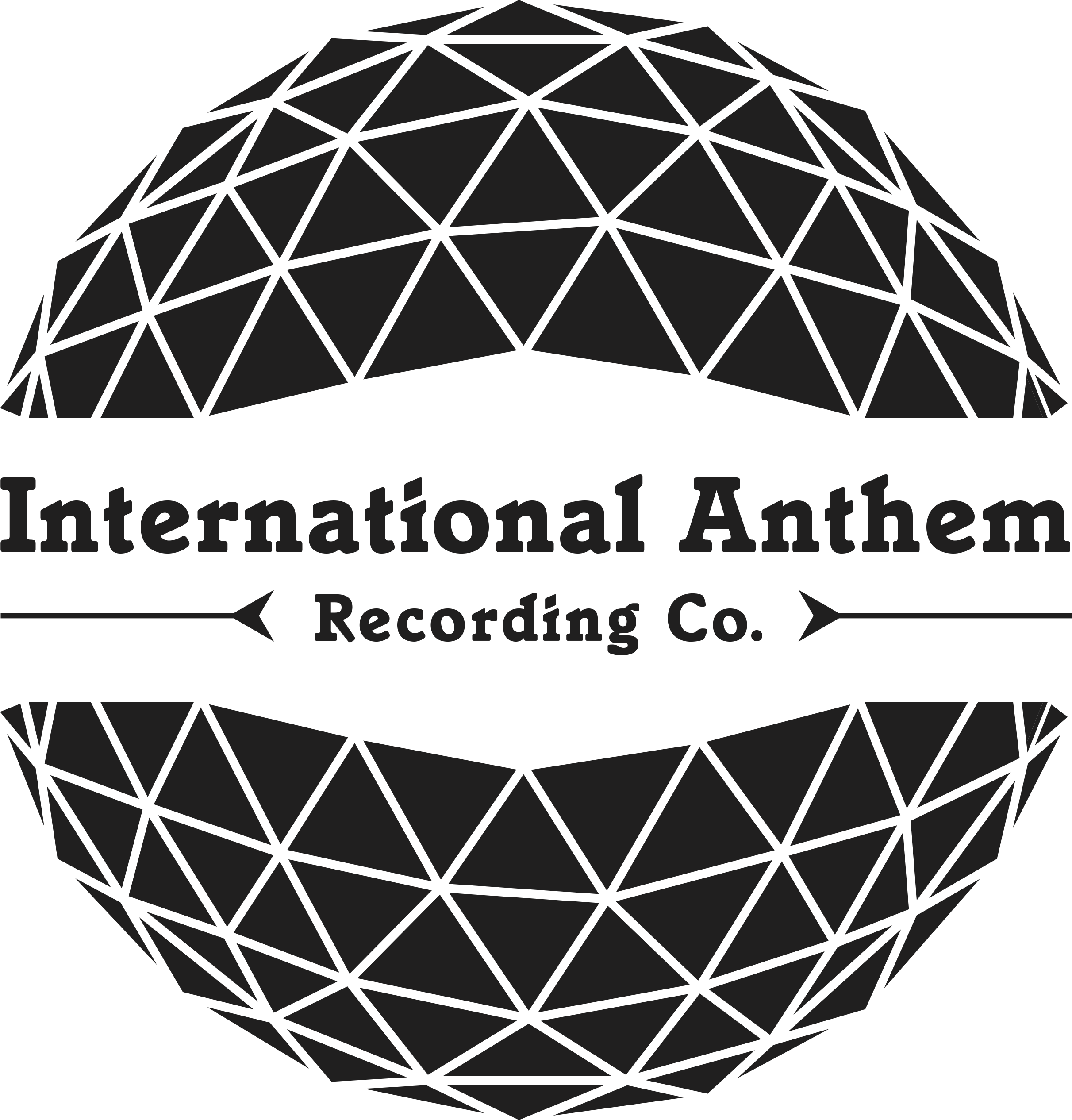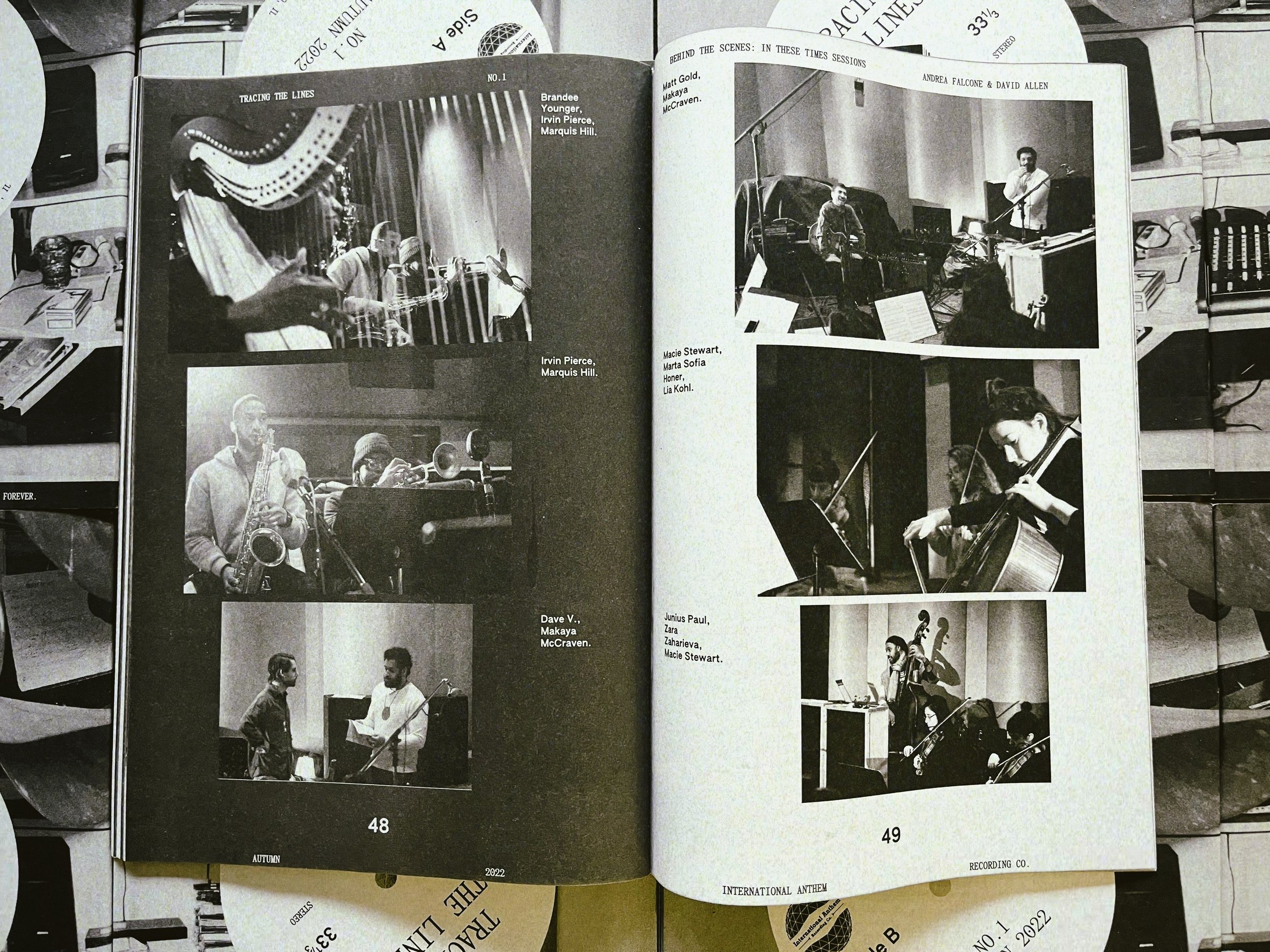
Issue #1
Going To-Ward
The Fear
Alabaster DePlume chats with Chris Kissel and Chuck Soo-Hoo of Contact Wave on 3/20/22
Alabaster DePlume
Photo: Alejandro Ayala.
CONTACT WAVE is a twice-monthly dublab radio program that enthusiastically celebrates the best experimental, avant-garde, psychedelic, and off-the-grid music crafted in L.A. and beyond. The show is co-hosted by culture writer Chris Kissel and musician Chuck Soo-Hoo.
CONTACT WAVE
When did you learn to play saxophone?
ALABASTER DEPLUME
Well, I moved into this big house full of crazy guitarists and I had just thrown away everything in my life, you know? I had just gotten rid of my whole identity and social group, and I jumped into this crazy house. And we were just getting drunk every night. And none of them played a reed instrument, so it didn't matter how bad I was. Playing an instrument is like a language. You've got someone who you enjoy chatting with, you're going to learn the language. And so we just got drunk every night playing music. And you end up making the horrible sound that you want to make.
CW
Were you a musician before that?
A
I was, yeah, yeah. But before that I was more like a poet. Like, for a year I would just travel as someone who just spoke. That's when I started calling myself "Alabaster DePlume", in order to become a new person. Because if anything goes wrong-goes weird-in the show, it wasn't me. It was Alabaster DePlume.
[all laugh]
CW
And that allows you to be a little bit freer with your performance, right?
A
I guess so, yeah, yeah, and it kind of opens you up to become a different character. It liberates you.
CW
It almost goes without saying that empathy is a big part of your approach to recording, and performance, and your art. I've seen that you worked as a mental health support worker and I was curious what you learned about yourself in that job.
A
I worked as a care-support worker for 10 years. I working with these two particular guys: Cy and Lee. And I learned all of the best things I know about performance and about leadership while doing that work. And I know I wouldn't be making this music the way I'm making it if I hadn't worked with those guys.
When I first started working with them I thought that I was just doing a job because I needed money-you know, how society encourages us to believe that we have to do things that we don't want to do because we have to get money-but I was so lucky to work with them because I love to care for people, but they showed me a way or expression and my team leader in that job, Maureen, showed me a method of leadership that requires the person involved to, like, she was aware that I wanted to make music so she put music making into the support and the method of support and she encouraged me to engage with the two men that we were working to support with their desire to express themselves with music and their desire to connect with their social group using music, by making music events happen, and to lead using joy, and playfulness, and openness to people's human expression. And it absolutely informs all of my work, the things that I did with them.
CW
What did you do? Did you play music with them? Did you listen to music with them? How did that actually work? I'm curious.
A
Oh yes, we played together. They had instruments in their house and we would play together and then we would make music events happen with, like, 30 people in a circle and you stand in the middle and you've got a hat and you're like, 'OKAY, when I hold the hat up high, we'll play really LOUD, and when I hold the hat low down we'll play quiet', for instance. And then one of them would take over and they'd hold the hat up high and RARARARA and this kind of thing, and I'd be playing my saxophone. And like, you can support people to play a keyboard and you go 'let's play just the black notes' and that's a pentatonic scale. And I can play a pentatonic scale in the same key as them. Someone plays guitar, for instance, and you can tune that guitar to a chord that's in tune with those black notes as well, you know? Just these ways of arranging things. I feel like there are two ways of leadership - there's a method of leadership where you make one of the people into the bad person and then you get everyone to hate them, and you've got nearly everyone working together against one of the people. And that's a method of leadership I've seen happen, sometimes in subtle ways. Or even within ourselves, we can find a part of ourselves that is the BAD part and we get all of the rest of ourselves against it. That's division and it's dehumanizing. If we don't want to do that, then we want to do something else. It's more like finding what the people want to do anyway and arranging things so that them getting what they want results in the work that we need to do. Does that make sense?
Alabaster DePlume with fellow Northerner/percussionist Bex Burch.
CW
It does. It's really using something about musical performance that seems to be universally true, regardless of genre, where folks are playing instruments together and people are able to sort of find the middle ground between an organized ensemble and their ability to express themselves individually - and when it's particularly thrilling is when people find that they can express themselves in unique ways that complement the group. And it's fascinating to think of that as a metaphor for how we might socially behave, in a way that makes us happier.
A. Yes, and they had to be them. You ever do a job for somebody and you felt like 'ahh you could have got anyone to do this, really' and they demand something very specific from you and it's like they say 'look, I don't care who you are, just do this, this, and this!' - and without realizing it, they've told you to leave. Well, if you don't need me, then I'm leaving. I will be somewhere else. Spiritually, emotionally, mentally. Preferably physically. I will be somewhere else, thank you. I will be somewhere where it had to be me there. I'm very sensitive to that stuff. My dad was like that too. Very sensitive to it. So if I'm going to be sensitive to that, I'm sensitive to the fact that I want my players to know that I invited them, and I must be vulnerable and open myself to whatever they choose that means. What does it mean for them to be here? So I must be ready to welcome them, whoever they tell me they are.
CW
There's a phrase that's on the cover of the new album, GOLD: 'go forward in the courage of your love,' and it's a phrase that you repeat in different configurations in the music itself. Why do you think having courage is something that's particularly important right now?
A
I love to ask people 'what do you need next?' And one of the things they've been saying to me is 'courage,' and I agree. I believe the main ingredient in courage is fear. You can't make courage unless you have fear. If you're not afraid, then it's not courage. Go towards the fear. And I think there is a lot of fear in the world now. And I wish for us, for myself, to create courage. Go forward in the courage of your love. That's something I've been saying to people. The whole album - a lot of it - is made of things that I have just been saying to people to help them make courage. 'Don't forget you're precious. I forget sometimes.' Blah, blah, blah. I say these things to people. I say them to them partly so that I hear it because I need to hear it. I need to remind myself to go forward in the courage of my love."
CW
"You mentioned Cy and Lee - which is the name of your previous album. It's an album of instrumentals that felt very interior, and I think a lot of people felt personally moved by it. Especially, as we were talking about, in the year 2020 when we were learning to live in isolation. But your new record, GOLD, feels more focused on the communal rather than the individual. Did you set out to make an album that focused on community this time around?
A
Everything I’ve done, in some small way, has pointed to this piece. As in this record, GOLD, I mean everything in my life. And the process, the method I use to make these records has grown more and more toward this communal way of creating something. And it’s quite a complicated method I’ve used to do this thing. I won't go into details now, but it involved a lot of preparation. A lot of moving things around so that the expression of the players would be an authentic one in response to each other. It was not a conscious decision to make Cy and Lee an individual experience, the way you put it. I promise I didn't know that there was going to be a global pandemic. That wasn't part of my marketing plan. I can't claim to be that clever. I didn't know it would be, but I am happy it has been useful. Until the moment we released it I felt sure I was going to get in a lot of trouble for putting that record out. I thought everyone was going to laugh at me. I won’t go into details about why, but you just feel those things, don’t you?
CW
[affirmation]
A
If anyone out there listening is working on something and you feel like everyone is going to laugh at you, do that thing. Do the thing. Know where you're coming from. Know why. I had to ask myself 'where am I coming from with this thing?' Even if everyone laughs at me, I am happy. The work that I'm making now, I would hope, isn't there? It's like 'oh, if I can't do anything then I will just hope,' and I feel more excited about making courage."
[laughing]
The work that I'm making now, I would not be making it this way if not for this community here- here at the Total Refreshment Centre. This community demanded of me this method, and I could only do it by doing it this way. By bringing different people together, different communities together, and making them welcome. You know we’re all guests in this world and so we’re all able to make each other welcome, and by being vulnerable I could give ownership of this music to more people. This develops into themethod that I’ve used to make this record. I don’t think I’d say I feel comfortable- you wanted to know why do I feel comfortable doing it this way? I don’t feel comfortable doing it this way and that’s why I do it this way. [laughs] I love doing it this way. I love it. I don’t know what’s gonna happen and it’s about enjoying not knowing what’s gonna happen. What’s the difference between being nervous and being excited? It even says in the record “I will not be safe. I will be naked like water. It’s the worst place to e. It’s where we are anyway. I will be there. I am there. I will be.” I wanted to be naked and vulnerable. It is quite scary, but I’ve been working on going towards the fear. Everything in my work and in my life changed when I started going towards the fear. The only way that I can know that I’m not doing what my fear tells me to do is if I go towards the fear. And we don’t always realize what we’re afraid of. We don’t realize what we’re avoiding, because we’re avoiding it [laughs] so it’s invisible to us. But if we work on it we can listen out for “ooh, I think I’m a bit scared of doing that. Why would that be? Let’s just go gently towards it. See if we can find out.” You make that a habit then you can find very interesting things.
Alabaster DePlume rocking an Anteloper tee.
Photos: Alejandro Ayala
CW
It sounds difficult. I can imagine there are moments where you get folks together and it doesn’t work. Does that happen, that you get musicians together and people aren’t able to coalesce?
A
Mmmmm…we get a different thing every time depending on who’s there. It’s not for me to say whether it worked or not. Another thing I might say is “do we want it to work or do we want it to play?”
CS
Yeah!
A
I love all of it. Sometimes it will feel one way, sometimes it will feel a different way. Sometimes it will feel… maybe some kind of awkwardness. I love it anyway. I have a responsibility to love it. I’m here to love it. I’m on this Earth to love doing this, so I’m going to. Did it work well for who? And for who to do what? It depends.
CW
That’s a philosophy of living too, right? That’s a way to go about your life and feel more content, I would imagine. You can say that you’re not placing a value udgement of everything that happens to you. That you accept things for what they are and you choose to view them openly and with love instead of gaging them and judging them.
A
Yeah, yeah! Like, a person knows if you’re trying to get something out of them, yeah? If you’re going to be goal-oriented with your friend- and you’ve just got them there cause you wanna get something out of them.
CW
That’s a good way to put it.
A
And of course the song knows too. The song knows if you’re goal-oriented. ‘I’ve put this gig together and I just need it to be good! It needs to be good so that I don’t have to do it anymore!” Or something. You know what I mean?
CW
Right, right, you’ll never be satisfied.
A
Yeah, yea, and I’m not doing this to get some success out of it. I love it.
CW
We’re going to ask you one more question, and the final question is: what is it like to be you?
A
[Long pause, Low whispers. Long pause]
It’s magic, you know. It’s like, it feels like giving up. Doing this work, it feels like…- you ever see a cartoon where a bridge is crumbling and someone’s walking on the bricks as they fall?
CW
Yeah.
A
It feels like that, but I’m kind of doing it in slow motion. And I’m able to just do it. It feels like letting go of a lot of things, recently, and I’ve been experiencing the moment that I’m in. And there’s a lot of interactions that I do in this work, especially recently. Lots of social media and lots of responses to things, about plans. The different artists, for instance, who are curating my bands for the shows I’m gonna do in the States. All of the plans for things, you know? And I could get very lost in my thoughts and in my worries about the future and about the past, and I could completely lose track, lose contract with the actual moment that I’m in. And that’s the only moment that I get in this life. This one. This one that we’re sharing now. This one. It’s the only moment. So I am going to be in it, and so I am in it by feeling the energy that’s inside my body and hearing the sounds that are happening around me, and feeling the stillness of the air, for instance, and I let go of this notion- this story- this idea of who I’m supposed to be, and what the future might be, and the past. I let go and I press in fear, even while I’m reposing an Instagram story.
Listen to an audio recording of the full Contact Wave episode:
Tracing The Lines is a creative exploration of International Anthem Recording Co. and the community that surrounds it.
Issue #1
64-page 170x250mm newsprint zine, printed in CMYK on 55gsm stock.
Banner photo by Lori Mendoza









